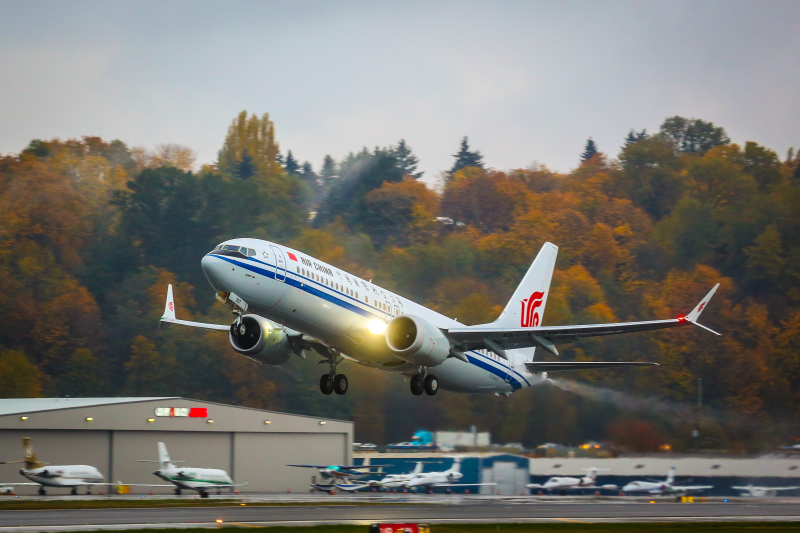
China’s ruling Communist Party never lets a good geopolitical spat go to waste, especially when it occurs in tandem with a safety issue that allows Beijing to take the moral high ground.
One year into its trade war with the United States, China was the first country to ground the Boeing 737 MAX following two fatal crashes that occurred five months apart. Nobody could fault the Civil Aviation Administration of China for prioritizing aviation safety, but by September 2021, with no indication the ban would be lifted, U.S. Commerce Secretary Gina Raimondo said during a speech in Washington that “there’s tens of billions of dollars of planes that Chinese airlines want to buy, but the Chinese government is standing in the way.”
With U.S.-China relations at a post-diplomatic normalization nadir, little progress has been made on the issue—until now. With an eye on minimizing the risk of conflict between the world’s two largest economies, the Biden administration is determined to stabilize ties with China ahead of a presidential election campaign next year that will make any political compromise with the U.S.’s archrival difficult, while Beijing is facing grim economic conditions and falling foreign investment. In the 2023 June quarter, the Chinese economy grew just 0.8% on a sequential basis, while foreign investment plunged 87% year-on-year to $4.9 billion, the lowest level on record.
At the same time, China could use the additional aircraft given that domestic air traffic has hit a new high even as the international segment lags at more than 50% below 2019 levels. In an Aug. 28 note to clients, Jefferies pointed out that China’s domestic air traffic jumped 72% annually in July, and 17% on a monthly basis, exceeding 2019 levels by 26%.
The conditions are thus ripe for Chinese airlines to resume delivery of the 737 MAX, which would buoy Boeing’s fortunes in that aircraft’s largest overseas market. Bloomberg reported on Aug. 25 that Boeing is preparing to deliver the first of the jets “within weeks,” with China Southern Airlines in line to take the first 737 MAX from Boeing. China Southern is the biggest operator of the 737 MAX in the country with 24 737-8s in its fleet, followed by Air China with 16 737-8s and Hainan Airlines with 11 737-8s.
Better late than never: While Boeing has found buyers for 55 of the 140 undelivered 737 MAX jets originally intended for Chinese customers, its bottom line will surely benefit if it can deliver the remaining 85 to Chinese airlines.
That this news broke ahead of Secretary Raimondo’s trip to China, which is focused on promoting U.S.-China economic ties, is no coincidence. Beijing has consistently blamed the U.S. for the poor state of the bilateral relationship. The optics of the U.S.’s most senior economic official visiting the Chinese capital and seemingly pleading—it will be expressed that way in Chinese state media—for a closer commercial relationship will resonate with the Chinese leadership, especially since Raimondo told NPR in September 2021 that “the Chinese need to play by the rules. We need to hold their feet to the fire and hold them accountable.”
Compare those fighting words to her more conciliatory tone struck in Beijing. “And while we will never, of course, compromise in protecting our national security, I want to be clear that we do not seek to decouple or to hold China’s economy back,” she said on Aug. 29.
If Boeing resumes delivery of the 737 MAX in China, it will face a long uphill climb to catch up with Airbus, which has taken advantage of its U.S.’s rival’s troubles to open up a commanding lead in the world’s second largest aviation market. Boeing has been effectively locked out of new orders from China since November 2017. It has only delivered 79 aircraft to China since January 2019 (Airbus delivered more than 100 in 2022 alone) and its market share has fallen to below 10%, behind Airbus and aspiring national champion Comac.
That said, both commercial—especially the rapid ascendancy of India’s aviation sector—and geopolitical factors will likely reduce the paramountcy of the China market to Boeing in the long run. Noting that China is projected to account for 13% of Boeing’s deliveries in 2024 and just 7% in 2025 compared to 22% historically, Jefferies said that “the future skyline looks less reliant on China.”
Great power competition between Beijing and Washington will remain a source of persistent tension and the biggest risk factor for Boeing’s business in China.
Boeing has not reached the stage at which it has to decide between continuing arms sales to Taiwan and selling passenger jets to China, but it cannot be assumed that day will never arrive.
